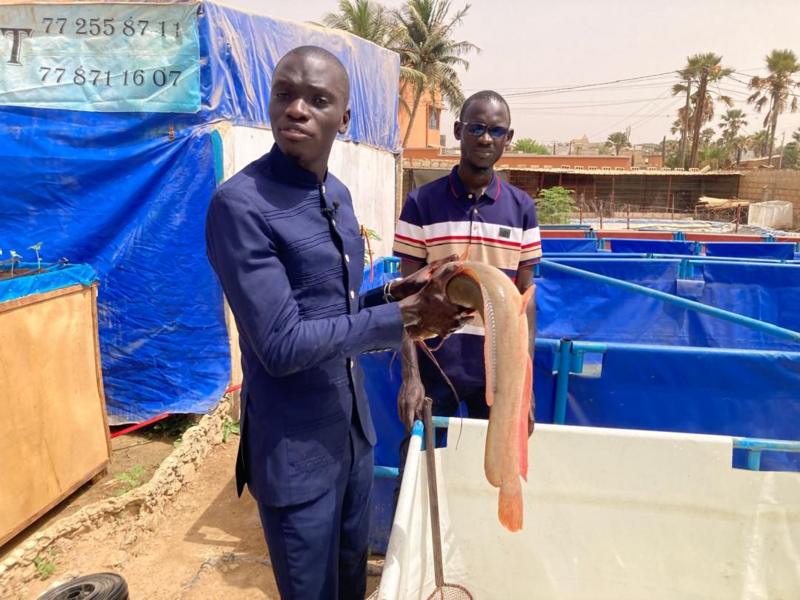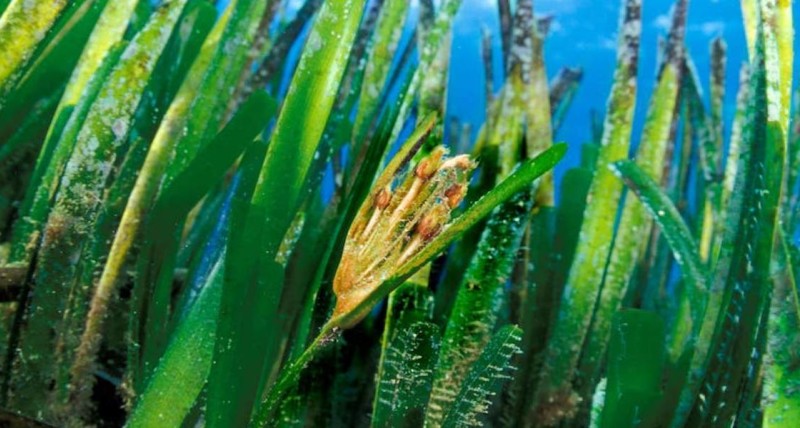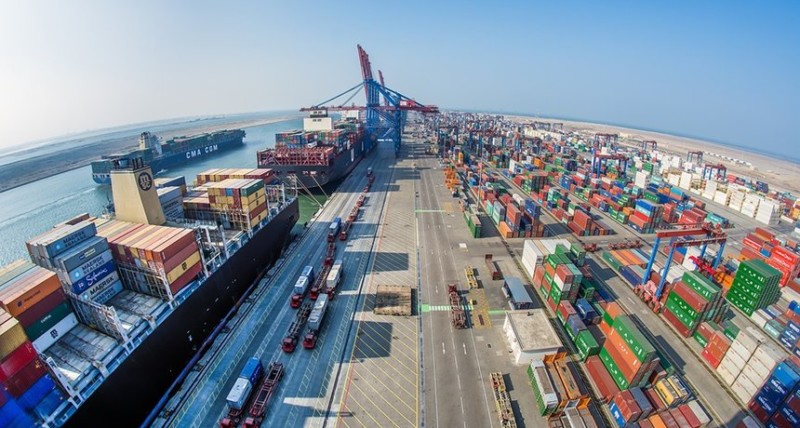Moussa Séne is a young Senegalese who sees things big. After his studies in France, he decided to return to Senegal to launch into aquaculture. A successful bet since today, it provides training to people wishing to get started in above-ground fish farming. Its objective is to encourage fish farming through its integrated farm.
“Ask someone for the house where they raise fish, they’ll tell you!” », Informs Moussa Séne on the other end of the phone. After racing down the asphalt road in the Nguinth district of Thiès, a town in western Senegal, we see young people sitting next to their motorbikes.
They point out a building where the paint on one of the walls is starting to fade.
“That’s where we raise the fish,” one of them tells us.
Also read on BBC Africa:
Artisanal fishing versus industrial fishing, why do conflicts persist on the West African coasts? April 28, 2023
Food waste transformed into protein thanks to black soldier flies February 26, 2023
In Togo, a young self-taught man manufactures intelligent solar panels December 1, 2022
We follow the wall of the building before turning right. There is no doubt, we have arrived at the Thiès Integrated Aquaculture Farm. It is also indicated in large letters on the exterior facade of the fence wall.
We pass through the gate and are greeted by the symphony of gossip and cackling of the poultry which rocks the atmosphere of the farm.
Moussa Séne, the owner of the place, has his hand immersed in a blue pool, at the bottom of which fish are wriggling.
After the usual salamalecs, he invites us to take a seat before starting to tell the story of the journey that led him to find this farm.
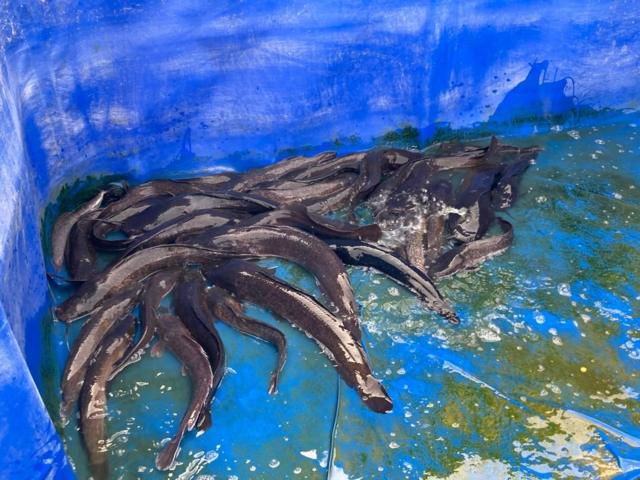
He covers his idea on nearly 500 pages and conducts the necessary environmental impact studies in order to properly put together his project.
However, this colossal project requires financing of one billion CFA francs, an amount that he cannot raise. “We had the two square kilometer marine concession that we had been granted. But it was just the financing that blocked the project,” regrets Mr. Séne.
“We had a lot of promises, but unfortunately, we did not have the funding and we are still searching to be able to obtain this funding,” he laments. Nevertheless, Moussa Séne does not let himself be discouraged and readjusts his project to create an integrated aquaculture farm.
What do we know about the mysterious spots on the skin of Guinean fishermen? April 17, 2023
His first fish harvest brings him a profit of 150,000 francs over 6 months.
“I had a very small pelvis,” he remembers. Three years later, it produces around a million fry per year.
“Today, I can say that I make millions of revenues. I don’t want to say the recipes I make, but I make quite substantial recipes,” he says with a broad smile that splits his face.
Although he modestly refrains from revealing to us the exact amount of his profits, he is nevertheless very proud to see what he accomplishes. Especially since some of his friends were not in favor of his idea of returning to Senegal.
Revolutionizing aquaculture, but not only…
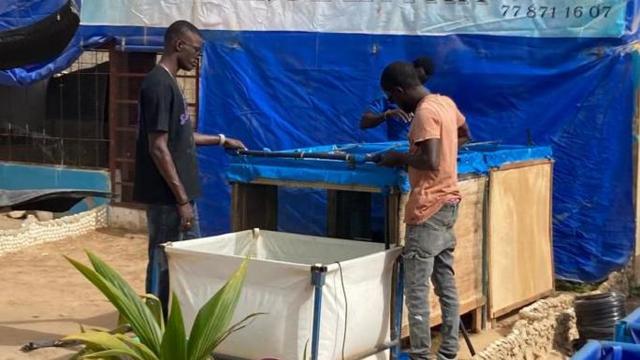
image captionWorkers are setting up the integrated system that Moussa Séne wants to popularize in Senegalese households.
Moussa Séne hopes with his skills and experience to be emulated.
He set up a project called ‘a home, a pool’. The goal is for each household to be able to produce the chicken, vegetables and fish they consume in a small space.
To succeed, he set up an interconnected system composed of a pond (to raise fish), a table (which serves as a plantation) which at the same time constitutes a henhouse.
“Once fed, the fish will produce droppings, a sort of fertilizer for the plants. It is an autonomous system which allows you to water your plantation with water from the fish pond which is very rich in fertilizing substances. This plantation, which serves as shade, constitutes a shelter for the chickens that we produce downstairs,” explains Moussa Séne, pointing to the poultry.
Alongside his integrated aquaculture farm, Moussa founded a research and fishing institute. A way for him to popularize his knowledge and contribute to the training of aquaculture technicians.
His institute also attracts several students from neighboring countries. This is the case of Alkassoum Mahamar, this Malian national hopes to replicate the same model in his country.
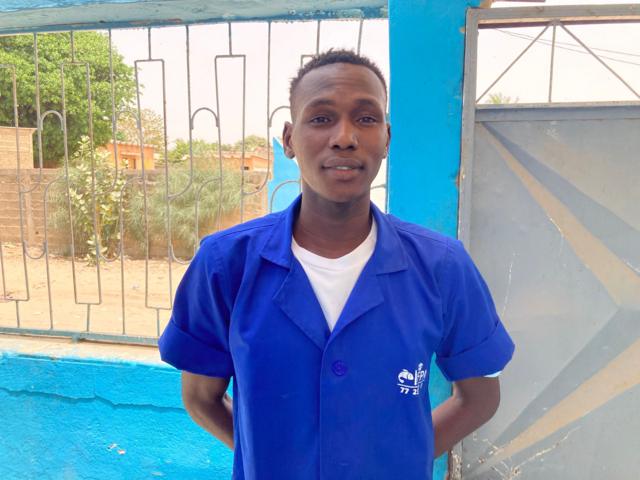
image captionAlkassoum Mahamar came from Mali to follow training in the institute founded by Moussa Séne.
“At the end of my training, I would like to return home and popularize what I learned here,” explains the young man. In addition to aquaculture, Mr. Mahamar is delighted to be able to return to Mali with other skills.
Beyond training in fishing and aquaculture, Mr. Séne’s institute offers what he calls ‘bonuses’.
“They are specialized in metallurgy, because they can do metal welding. They can also do wood carpentry and they will also have a driving license from this institute before leaving,” explains Moussa Séne.
When a Chinese factory sets up in GambiaApril 20, 2023
Contributing to food security in Senegal
Moussa Sene
Today, it is a feeling of pride that drives Moussa Séne when he looks at the fifty ponds installed on his farm.
“We deliver a million fish per year to Senegal in the sub-region,” he boasts. Thanks to his farm, he employs around twenty people and allows resellers to obtain supplies from him.
If Moussa Séne rubs his hands thanks to the profits he reaps, the aquaculture sector, according to him, faces several challenges, notably fish feeding.
“Fish feed is really very expensive, it costs a lot and it reduces the profitability of this activity,” sighs Mr. Séne.
Nevertheless, he does not regret his choice: “since I started with a pond and am here today for two or three years, I have hope of having the ten hectares that I plan to do and which can certainly contribute to food security at the national level. »


